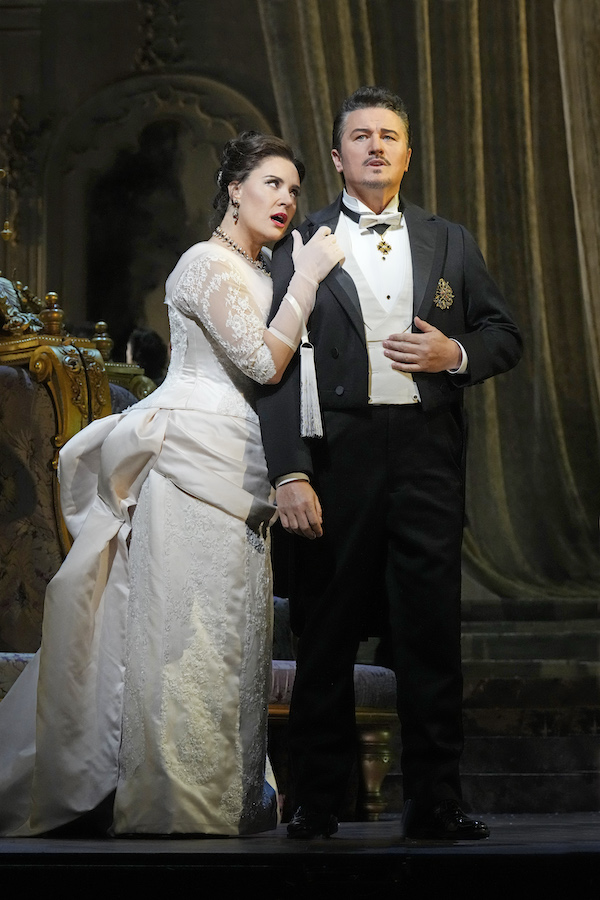“Fedora” returns to Met after 25 years in a sumptuous, richly sung production

Fedora returned to the Metropolitan Opera on New Year’s Eve after 25 years. A glamorous diva with a sumptuous voice and a dashing romantic tenor is what it takes to make Giordano’s melody-strewn melodrama take flight. Sonya Yoncheva as Princess Fedora Romazoff and Piotr Beczała as Count Loris Ipanoff sent it into orbit.
The opera is a story of jealousy, murder, intrigue, and love. Count Ipanoff kills Count Vladimiro Andrejevich, who is having an affair with his wife. Fedora, Andrejevich’s fiancée, seeks revenge. Before she learns the truth and falls in love with Loris, Fedora sets into action events that will claim the life of his brother and mother. Overcome with remorse, Fedora drinks the deadly poison contained in the cross that she always wears suspended on a chain around her neck.
David McVicar is the Met’s go-to director these days and this Fedora is one of his best stagings yet for the company. Firmly planted in the late nineteenth century, set designer Charles Edwards’ realistic renderings of the three locations in which the opera takes place—a palace in St. Petersburg, a fashionable Parisian salon, and the Swiss Alps—serve the story, but even more so the music.
A giant proscenium is the foundation for Charles Edwards’ sets. Snow falls outside the doors of Andrejevich’s apartment, which is decorated with portraits and icons. His death bed is revealed behind a scrim.
For the second act, the decor and women’s costumes are in a champagne color, perfect for New Year’s Eve, as are the bottles of Veuve Clicquot, which are integral to the plot. Atop a grand staircase, sits a grand piano. The separation of space imposed by the staircase provided a sense of intimacy when Fedora and Loris expressed their love for each other downstage, apart from the glittering crowd clustered around the piano.
In the final scene, the Alps tower in the background. The furniture and even the railings are lifted right out of a Swiss mountain chalet.
As usual, McVicar introduces a stage element, which is not in the libretto, into the drama. A portrait of Andrejevich hangs in each of the three rooms. He appears as well in physical form in the final two acts. It’s no harm, no foul in this case, apart from his oversized shadow dominating the set while Fedora lies dying.
Yoncheva and conductor Marco Armiliato are fresh off a Fedora run at La Scala. Having attended the premiere performance there, it is clear that the soprano’s connection with the role has increased exponentially in just over two months. Brigitte Reiffenstuel’s sumptuous period gowns no doubt helped Yoncheva to find the core of her character. But vocally and dramatically, this was a far more compelling performance.
Mirella Freni, the last soprano to sing Fedora at the Met, exuded majesty and restrained passion. By comparison, Yoncheva was more imperious and dangerous, singing with a freedom that was not evident in either her solo recital or as Élisabeth de Valois in Verdi’s Don Carlos last season. Fedora’s emotional tempest kindled emotions in Yoncheva which resulted in free-flowing, voluptuous sound that equalled the physical glamour that she brought to the role.
A dashing, handsome Loris, Beczała poured out rich, golden sound from the moment he first appeared on stage. There were subtle dynamic shadings, but the tenor was in overdrive, which provided an apt element of danger to his Loris. The role is clearly a stepping stone on the path to his debut as Calaf in Puccini’s Turandot in Zurich later this season.
Beczała’ s “Amor ti vieta” whose melody courses through the opera, was wonderful. The combination of his gleaming tenor and Yoncheva’s rich soprano, throbbing with emotion, in the Love Duet was magnificent.
In the midst of the dramatic turbulence, McVicar inserted some lighter, almost comic touches, all courtesy of Rosa Feola’s Olga and Lucas Meachem’s De Siriex. Feola’s ditzy Olga was a delight as she showed off her latest protege, the foppish Polish piano virtuoso Boleslao Lazinski (Bryan Wagorn) and sparkled vocally in “Eccone un altro più somigliante ancor”, in which she compares the men of Paris to Veuve Clicquot. Physically and vocally commanding, Meachem sang of Russian women with aplomb in ”La donna russa è femmina due volte”.
As Cirillo, bass-baritone Jeongcheol Cha created a vivid impression with his resounding voice as he told of Andrejevich’s final moments. Bass Richard Bernstein gave a characterostically polished performances as Dr. Boroff.
The stage magic was equalled by the wondrous sounds emanating out of the pit. From the tinkling of the bells in Act I to the sonorous playing of the cellos in the final scene, the Met Orchestra reveled in Giordano’s melodious and colorful score. The Act II Intermezzo was stunningly beautiful.
There was one loud, vociferous boo from a young man seated behind me when McVicar and his team took their bow. It would be interesting to learn what he found so objectionable. The rest of the audience had long been on its feet cheering and applauding. It was a memorable night at the opera, as well as the perfect way to ring in the New Year.
Fedora continues through January 28. metopera.org


Posted Jan 02, 2023 at 4:50 pm by ken howard
I’m sorry you didn’t turn around and ask that guy what his problem was. But I have to say I thought the addition of the dead lover as a … ghost? … was almost magical in its romantic force. It was a pretty special night.